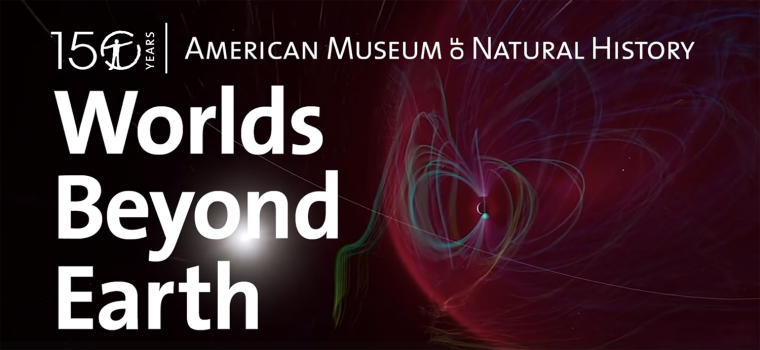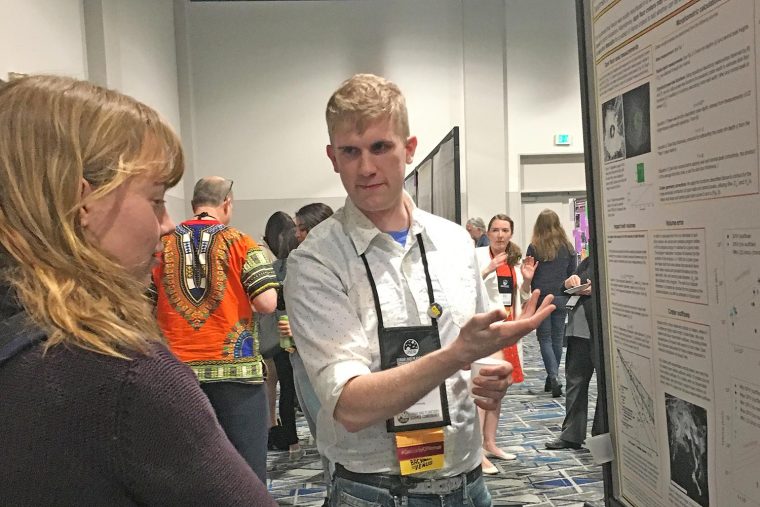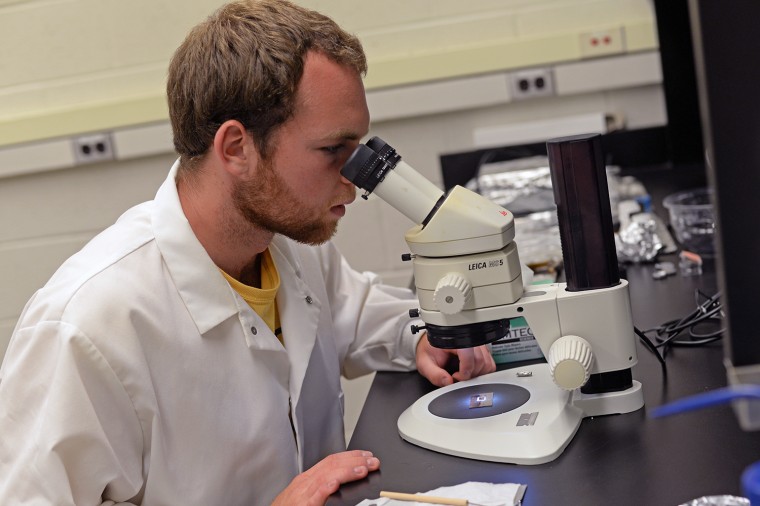James Greenwood, research associate professor of earth and environmental sciences, received a grant worth $494,517 from NASA. The grant will support his research titled “Water in Lunar Rocks: Petrologic and Isotopic Analyses of Phosphate Minerals in Apollo’s Samples” through June 30, 2014.
James Greenwood, visiting assistant professor of earth and environmental sciences, was mentioned in a June 14 BBC News science article on “Much More Water Found in Lunar Rocks.” Greenwood and Professor Lawrence Taylor from the University of Tennessee in Knoxville, have come up with evidence on the origins of lunar water: comets. According to the article, they believe there were a lot of comets flying around at the time of the Moon's formation, "hitting the little, nascent, early Moon some 4.5 billion years ago.”
Jim Greenwood, research assistant professor of earth and environmental sciences, holds a slide with a moon rock sample that contains water. The water was found in the mineral apatite, which he and his team were able to identify in the sample. (Photo by Olivia Bartlett Drake)Soon after the Apollo spaceflights to the moon, experts examined the rocks brought back by the astronauts and declared with certainty that the moon was a dry, waterless place. Forty years later, James Greenwood begs to differ. Not only does he have proof, his findings strongly suggest that some of the lunar water he found…
Greenwood's pioneering technique gives evidence of lunar water with different origins from water on earth.
Seven faculty were conferred tenure by the Board of Trustees at its most recent meeting. Their appointments will be effective on July 1. They are: Ren Ellis Neyra, associate professor of English James Greenwood, associate professor of earth and environmental sciences Cameron Donnay Hill, associate professor of mathematics Daniel Licata, associate professor of computer science Rashida Shaw McMahon, associate professor of English Laura Ann Twagira, associate professor of history In addition, one faculty member was promoted: Naho Maruta, associate professor of the practice in East Asian studies Brief descriptions of their areas of research and teaching appear below. Ren Ellis…
Research conducted by a Wesleyan professor is part of a new space show at the American Museum of Natural History. Martha Gilmore, George I. Seney Professor of Geology and professor of Earth and environmental sciences, worked over the past year developing content for the new Hayden Planetarium Space Show Worlds Beyond Earth. The show opened on Jan. 21 as part of the museum's 150th anniversary celebration. "It’s amazing," Gilmore says. "The images that you see are all realistic. We even contacted some of the engineers for the Magellan spacecraft in order to understand exactly how the spacecraft imaged Venus in…
Several Wesleyan students, faculty, and alumni attended the 50th Lunar and Planetary Science Conference (LPSC) March 18-22 in The Woodlands, Texas. Members of the Wesleyan Planetary Sciences Group presented their research on a range of planetary bodies. This annual conference brings together international specialists in petrology, geochemistry, geophysics, geology, and astronomy to present the latest results of research in planetary science. Earth and environmental studies major Emmy Hughes '20 presented a poster titled “Observations of Transverse Aeolian Ridges in Digital Terrain Models" during a session on “Planetary Aeolian Processes.” Earth and environmental science graduate student Reid Perkins MA '19 presented a…
In this recurring feature in The Wesleyan Connection, we highlight some of the latest news stories about Wesleyan and our alumni. Recent Wesleyan News 1. Science Magazine: “India Plans Tricky and Unprecedented Landing Near Moon’s South Pole” James Greenwood, assistant professor of earth and environmental sciences, comments on India’s plans to unleash a rover into previously unexplored territory near the moon’s south pole. 2. Newsweek: “Putin Keeps His Foot Firmly Pressed on Europe’s Windpipe” Matthew Finkel ’18 writes that Moscow will likely be able to leverage its enormous energy exports to project soft power in Eastern Europe for years to…
Three Wesleyan students, faculty and several alumni recently attended the 47th Lunar and Planetary Science Conference in The Woodlands, Texas. This conference brings together international specialists in petrology, geochemistry, geophysics, geology and astronomy to present the latest results of research in planetary science. The five-day conference was organized by topical symposia and problem-oriented sessions. Earth and environmental sciences graduate students Ben McKeeby and Shaun Mahmood, and earth and environmental science major Melissa Lowe ’17 presented their ongoing planetary science research at the conference. Lowe received a NASA CT Space Grant travel award to attend the conference. McKeeby shared his research titled, "An investigation…
Four Wesleyan undergraduates and a faculty member received awards in the latest call for proposals from NASA's Connecticut Space Grant Consortium. Astronomy major Rachel Aronow '17 was awarded an Undergraduate Research Fellowship in the amount of $5,000 for her project, "Planet Formation and Stellar Characteristics in Tatooine-like Systems." She is working with Bill Herbst, the John Monroe Van Vleck Professor of Astronomy, studying Tatooine-like systems (named after the fabled home system of Luke Skywalker), which are planet-forming disks that surround a close pair of stars that are in orbit around each other. Aronow conducted research with Herbst last summer, and these funds will support further…
Jesse Lieman-Sifry '15 received a $5,000 Undergraduate Directed Campus Scholarship from the Connecticut Space Grant Consortium, funded by NASA. The award will be applied to his financial aid package and support his ongoing research in the Astronomy Department.
As a recent recipient of an undergraduate research fellowship, Jack Singer '15 is spending his summer at Wesleyan studying the geochemical evolution of the moon. The fellowship, supported by the Connecticut Space Grant College Consortium, comes with a $5,000 award. Grantees are expected to work on research related to space/aerospace science or engineering under the guidance of a faculty member or a mentor from industry. For the next three months, Singer will work on various research projects with his advisor James Greenwood, assistant professor of earth and environmental science. Singer will first prepare a fragmented lunar sample (Apollo 12035,76) for…







